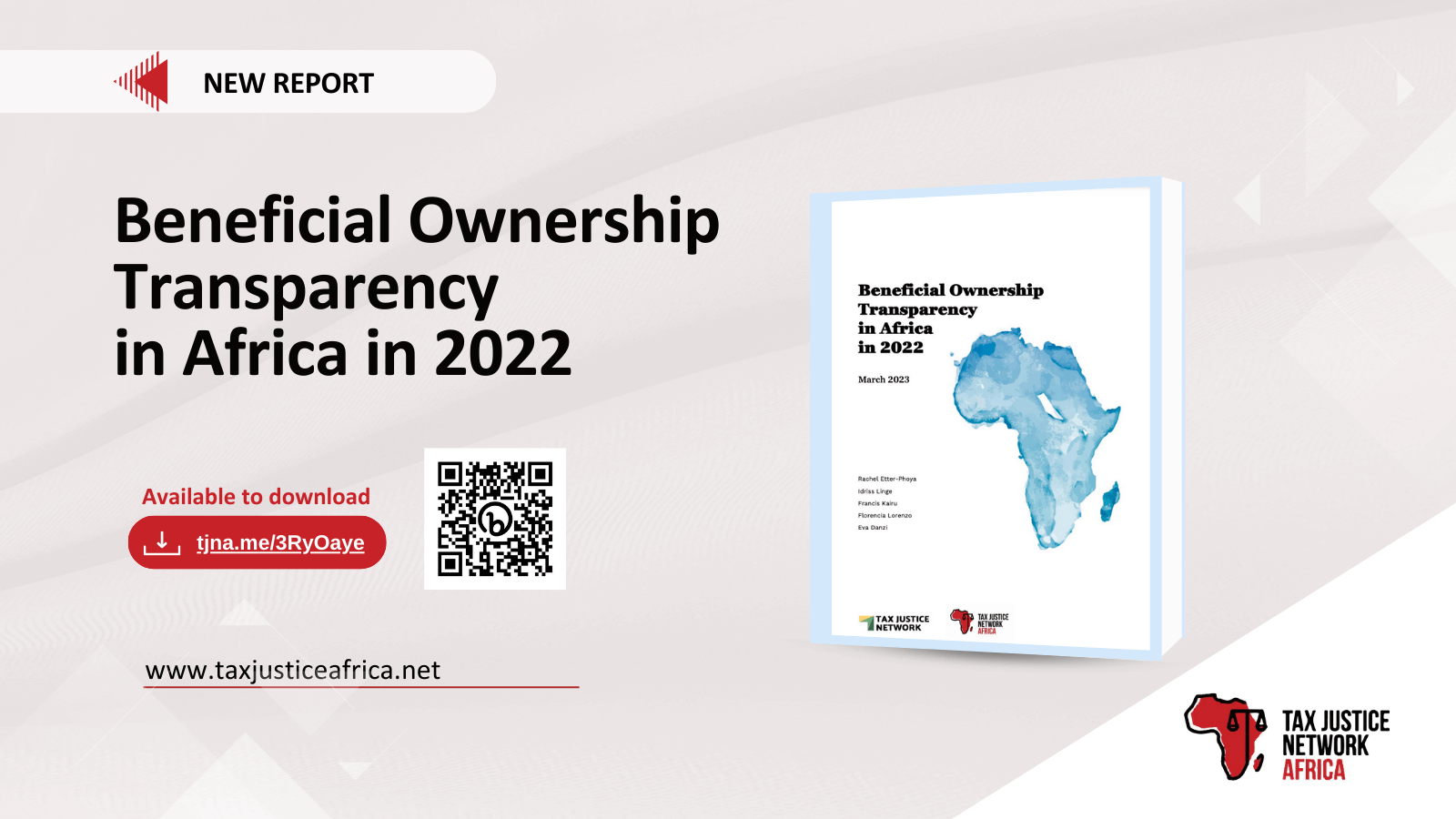Date

A new report commissioned by Tax Justice Network and Tax Justice Network Africa (TJNA) titled Beneficial Ownership Transparency in Africa in 2022, recommends beneficial ownership transparency as a measure that African governments should take to help in the fight against illicit financial flows.
The report recommends that all owners of all legal vehicles need to register and keep their information up to date with a government authority.
The report also sheds light on the state of Beneficial Ownership Transparency in Africa and examines the commitments of all African countries to beneficial ownership transparency. There are further recommendations that all information should be accessible to the public, and there should be rigorous verification mechanisms in place and sanctions that are strong enough to act as a deterrent.
The report also looks into 18 African jurisdictions covered by the Tax Justice Network’s Financial Secrecy Index 2022. This includes assessing who has to register, when they have to register, and whether the general public has access to information on the real owners of companies.
An increasing number of African governments have pledged their commitment to achieving transparency in beneficial ownership within specific sectors, within the framework of the Extractive Industries Transparency Initiative (EITI), 28 African nations committed to disclosing beneficial ownership information for companies operating in the extractive industries, in accordance with the EITI Standard requirement 2.5.15, starting from January 1, 2020.
Furthermore, in 2020, as part of their efforts to secure financing from the International Monetary Fund (through mechanisms such as rapid credit facilities, rapid financing instruments, or regular IMF-supported programs) for expenditures related to the Covid-19 pandemic, 34 African countries committed to publicly disclosing the identities of beneficial owners for companies that were awarded government contracts.
As of the beginning of 2023, 23 out of 54 African nations have established legal frameworks mandating that the true individuals, or beneficial owners, behind legal entities, must reveal their identities to a governmental agency. Additionally, over half of the continent has pledged to publicly divulge information about beneficial owners in sectors susceptible to corruption and fraud, including public procurement and the extractive industries.
Beneficial ownership transparency, as well as its absence, exerts an influence on government finances and the prevalence of corrupt activities throughout the continent. This report further draws in the lens of four countries Cameroon, Kenya, Liberia, and Senegal illustrate the capacity of efficient beneficial ownership transparency. It forms a critical component of the toolkit available to law enforcement agencies in their efforts to combat money laundering and the unlawful enrichment of public officials. Additionally, it aids revenue authorities in combating tax abuse and fosters improved oil and mining contract management.
To make beneficial ownership transparency a potent tool in combating illicit financial activities, it is imperative that all owners of legal entities register and maintain current information with a governmental entity. Complete accessibility to this information by the public is essential, along with the implementation of robust verification processes and sanctions that serve as a formidable deterrent.
To mitigate some of the challenges that Africa is facing, the report recommends the importance of a comprehensive scope, requiring all legal entities, regardless of their nature, to disclose the natural person who owns, controls, or benefits from them and further emphasises the registration of both legal owners and beneficial owners, encompassing all individuals with titles or direct interests in the legal entity, and any natural person who has any form of ownership, control, or benefit from it.
The report also recommends all legal entities register beneficial ownership information if they aim to incorporate domestically, possess domestic assets, conduct domestic operations, or include a domestic participant.
Emphasis is additionally laid on the significance of detailed identification information for all owners and the importance of keeping this information up to date, ensuring clarity and reducing the potential for confusion.
The report further recommends that there is a need for accessibility and verification of information, requiring that legal and beneficial ownership data be freely available to the public in open data formats and subject to automated analysis to maintain consistency with other databases. This includes the confirmation of the status of registered beneficial owners and introducing measures to flag any anomalies or suspicious characteristics.
By incorporating these targets into beneficial ownership frameworks, countries can significantly enhance transparency, accountability, and the effectiveness of their efforts to combat illicit financial activities, ultimately fostering a fairer and more just economic landscape in Africa.
To access the full report, please visit tjna.me/3RyOaye
For more details on our work on Beneficial Ownership, please contact fkairu@taxjusticeafrica.net